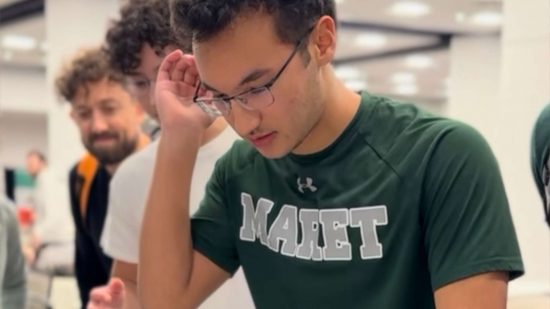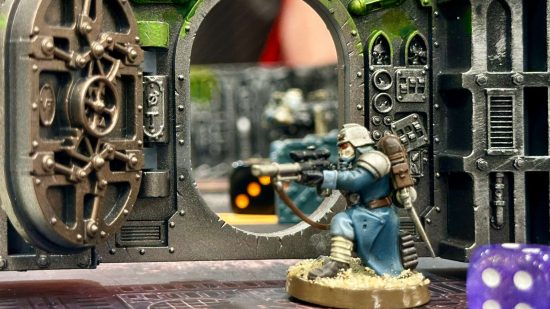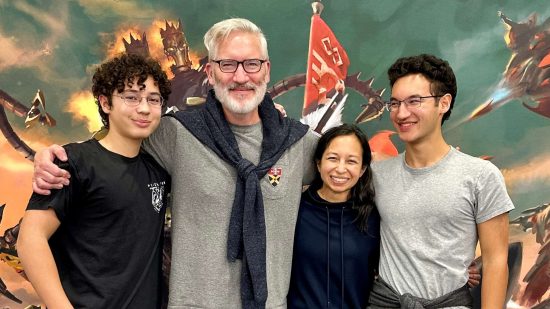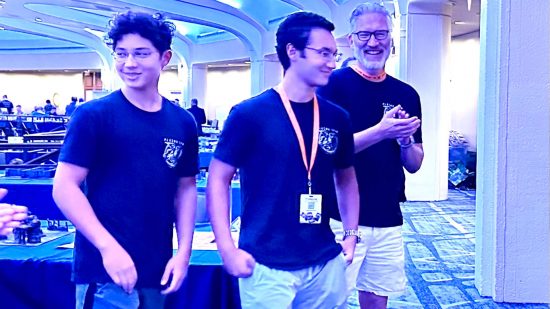When a track and field injury meant young athlete Leander Garrett had to use a wheelchair to get around, he wasn’t able to participate in the sports he loved. So he got seriously into the tournament scene for Warhammer 40k Kill Team, and over the course of two intense years, made it all the way to the Warhammer World Championships.
Now 16 years old, Garrett “played center back and coordinated the defensive line” on his high school soccer team, has a second degree black belt in Tae Kwon Do, and loves the 400 meter track athletics event. In December 21, midway through ninth grade, severe stress fractures in both legs from a track injury made it “too painful to get around school on crutches… I started using a wheelchair soon after”.
Garrett says that the injury “suddenly cut [him] off” from the sports he loves. “I loved competing as an athlete, playing soccer with my friends during lunch, and looked forward to sports practices after school each day”. He adds “I am a competitive person, and with sports off limits to me, I was searching for another fun activity I could compete in”. That’s where Warhammer 40k: Kill Team comes in.
“My family started playing Warhammer 40k during the pandemic”, Garrett says, but the “simpler, shorter game” of Kill Team soon took over as his main interest. He’s enamored by it. “Kill Team is compelling because it is complex, and encourages strategy to navigate. No one has come close to “solving” the game”.
It took some tough lessons for Leander to get good at Kill Team, though. “When I started playing Kill Team, I was too cocky”, he says, admitting “I wasn’t willing to ask my opponent what I should do better or analyze my mistakes”. He started competing in tournaments in early 2022, and certainly learnt from those lessons.
The organisation of tournaments often created barriers for Garrett. Most of the problems were practical. “At tournaments gaming tables are high and meant for standing height”, Garrett says, adding “the chairs provided at tournaments were often too low to fully see the table, putting a sitting player at a disadvantage”. His dad Marc took to bringing a tall stool to tournaments.
Moving from table to table in a wheelchair, while balancing an army, is also a challenge. “My dad and brother, who also play Kill Team, and my mom would help”, Garrett says. Even getting to the gaming hall at large events could be challenging: “the elevator was often out of the way, and thickly carpeted floors created friction”.
Garrett came first in the Kill Team tournament at Adepticon, Chicago, 2023, earning him a golden ticket to the invite-only World Championships of Warhammer, along with a paid flight and accommodation. Adepticon was “an amazing tournament with highly skilled opponents, and an excellent tournament organizer”. As for how it felt to win? “Unreal. For days afterwards I kept waking up and thinking it must have been a dream”.
The World Championships took place in Atlanta, Georgia, in November. It was “the best Kill Team tournament I’ve ever competed in”, Garrett says. He adds: “Each opponent I played was a master”. Players from around the world took part, and Leander says “meeting the international players, including Ace from Spain and Mateusz from Poland” was another highlight.
Garrett placed 13th out of 38 contenders overall, winning best factional for Veteran Guardsmen. He was one point away from winning his last match, which would have seen him move through to the the top bracket and a chance at a podium spot.
Garrett has been doing physiotherapy for two years now, and was able to attend the World Championships of Warhammer without the aid of a wheelchair. “I am still recovering”, he says – he hopes to be able to return to running track this Spring. But he’s not done with Kill Team; he plans to compete for another shot at Worlds in 2024.
The switch from sports to wargaming has changed Leander’s attitude to competition. “It was only when I learned humility that I started to improve as a Kill Team player”, Garrett says; “I plan to take that humility back into competitive sports”.
Competing with a disability has also changed his outlook: “When you have an injury like this you realize you can’t do it all on your own—it takes a support network like a close-knit family, my Plasma Spam Team, a tournament organizer who works with your disability while still holding you accountable, and a welcoming community.”
If you use a wheelchair and would like to get into competitive wargaming, or you are a tournament organiser who would like to make your events more accessible to wheelchair users, check out this article, in which wheelchair users share their advice and experiences from the competitive Warhammer 40k scene.
Photographs kindly provided by Marc Garrett and Wasima Garrett.



